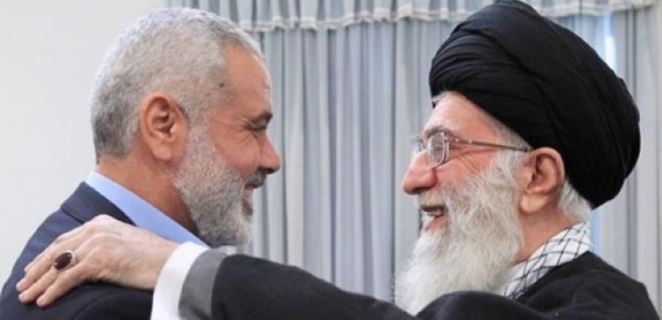
The Islamist regime of Iran has traditionally used two front militant groups, Hamas and Hezbollah, in its proxy wars against Israel. As it happens, Hamas is Sunni, and Hezbollah is Shiite. In the past there has never been a fissure between the Islamic Republic and its allies, all united through Islamism and hostility against Israel. But times have changed. Since the uprising of the people of Syria against the regime in Damascus (sadly, today to a great extent hijacked by Sunni Islamists), these groups have had to take sides. And the two did not make the same choice.
The Shiite group, Lebanese Hezbollah, stands firmly along Iran and its old ally, Syria.
Thousands of Hezbollah’s fighters from Lebanon have streamed into Syria to help Assad take a stronghold for the rebels in Qusair this week and the seizure may turn the two-year conflict in his favor.
While the West debates whether to intervene on the side of the rebels, and pushes for peace talks this month in Geneva, Hezbollah and its patron Iran have gone all in to keep Syria in the hands of an anti-American dictator.
As an example:
At the very end of a small street in the Shiite suburbs of Beirut, Abou Ali, a Hezbollah fighter, talks of why he is fighting fellow Muslims in Syria.
The Syrians who have rebelled against President Bashar Assad are “Takfiris,” he said, Sunni Muslims backed by Persian Gulf state emirs who view Shiite Muslims like himself as apostates, or “impure.”
At least 80,000 people have died in Syria since a peaceful protest movement that began in March 2011 turned into an armed rebellion after a massive regime crackdown. Ali, a Hezbollah fighter in his late 30s, said he is willing to die in Syria too.
“My children and my family will be taken care of if I am martyred,” Ali said. “Everyone who is sent to fight in Syria has received a ‘Taklif Sharii,'” or a religious command that means he will go to heaven if killed.
So it seems the motivations for Hezbollah joining Assad have been religious? Not everyone agrees.
Iran is a Shiite Muslim theocracy and the Assad regime is headed by Alawites, who are a Shiite offshoot. But it is not the centuries-old divide in the Muslim world that prompted Iran to unleash the Shiites of Hezbollah, a force also known as the Party of God that Iran has trained and armed for years, according to the U.S. State Department.
“The Assad regime has always supported the Party of God — Iran’s proxy in Lebanon — during the various Lebanese wars against Israel,” says Nadim Shehadeh from Chatham House, a London think tank. “In addition, Syria has long been a conduit for Iranian weapons transfers to Hezbollah.
“The party is a regiment of the Iranian Revolutionary Guards and is acting in that capacity in Syria,” Shehadeh said of Iran’s military.
As it happens, however, there is another group that the regime of Syria has been supported, and transferred weapons to, from Iran. That group is Hamas, the organization ruling the Gaza strip. And despite everything Mr. Shehadeh says, Hamas has done the exact opposite thing-and paid a price.
Iran has cut funding for Palestinian Islamist movement Hamas for siding with its Sunni co-religionists in Syria in their war against President Bashar al-Assad and the Shiite Hezbollah movement, Hamas leaders have said.
Hamas’s deputy foreign minister Ghazi Hamad told The Telegraph this week that relations with Iran are “bad.” “Diplomatically, I have to use other words.”
Regarding Iran’s funding to Hamas, he said: “I can say it is not like the past. I cannot give you the exact amount. For supporting the Syrian revolution, we lost very much.”
“I cannot deny that since 2006 Iran supported Hamas with money and many [other] things. But the situation is not like the past. I cannot say that everything is normal,” Hamad said.
Iran’s annual financial aid to Hamas is believed to be around $20 million, which helps the group run its government in the Gaza Strip.
But the crisis in Syria has led to problems between them. Hamas, a Sunni Islamist groups, supports Sunni rebels in Syria. Shiite Iran, however, sided
with the Assad’s regime, which consists mainly of Allawites, who are close to Shiisim. Hezbollah, the Shiite Lebanese militia has also sided with Assad and
sent fighters into Syria to support Assad.
Shocking! How can the “experts” be wrong? They tell us militant groups are not necessarily about religion, that there are political factors, that alliances are complex…and yet at the end of the day, these groups end up lining up along confessional fault lines?
The story does have a funny point, though.
“We never expected that a country like Iran, which talked about oppressed people and dictatorial regimes, would stand behind a dictator like Assad who is killing his own people,” Ahmed Yousef, an adviser to Ismail Haniyeh, Hamas’ prime minister, said, according to The Telegraph.
Gee, you think? I mean, it is not like the regime of Iran would ever do something like this?
